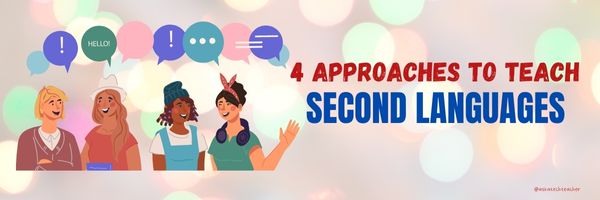Author: Jacqui
Private ESL Tutoring: Your Pathway to English Proficiency
Learning a second language is a challenge, whether it be English, Russian, or any of the hundreds of world languages we find across the globe. You may need to do this because you’ve moved to a new country, because your job changed, or it’s a personal interest. The question becomes: How to make that happen? Do you immerse yourself? Use an app? Take online courses? Or something else?
One of our Ask a Tech Teacher crew has another idea that may be the fastest, most efficient: Private ESL tutoring:
Private ESL Tutoring: Your Pathway to English Proficiency
Share this:
- Click to share on Facebook (Opens in new window) Facebook
- Click to share on X (Opens in new window) X
- Click to share on LinkedIn (Opens in new window) LinkedIn
- Click to share on Pinterest (Opens in new window) Pinterest
- Click to share on Telegram (Opens in new window) Telegram
- Click to email a link to a friend (Opens in new window) Email
- More
9 Mistakes Teachers Make Using Tech in the Classroom
It’s easy to confuse ‘using technology’ with digital tools. Your school passed iPads out to all classes. Some of your colleagues think having students read in this tablet format means they’re integrating technology into their curriculum. Kudos for a good start, but they need to use the tablets to differentiate for student learning styles, enrich learning materials, and turn students into life-long learners.
That’s harder than it sounds. Technology hasn’t been around long enough to beget standards that work for everyone (not withstanding ISTE’s herculean efforts), the set-in-stone of settled science. Truth, that will never happen. Technology tools populate like bacteria in a culture. Every time you turn around, there’s another favorite tool some teacher swears has turned her students into geniuses and her class into a model of efficiency. After fifteen years of teaching technology, chatting with colleagues, and experimenting, I can assure you there is no magic wand. What there is is a teacher not afraid to try new ways, test them out in a classroom environment, toss what doesn’t work and share the rest. Her/his success doesn’t come without lots of failure and mistakes, widgets that sounded good but were too complicated or non-intuitive for a 21st century classroom.
Which of these nine mistakes do you make? Then, see how to fix them:
Share this:
- Click to share on Facebook (Opens in new window) Facebook
- Click to share on X (Opens in new window) X
- Click to share on LinkedIn (Opens in new window) LinkedIn
- Click to share on Pinterest (Opens in new window) Pinterest
- Click to share on Telegram (Opens in new window) Telegram
- Click to email a link to a friend (Opens in new window) Email
- More
The Top 5 AI Quiz Builder Tools That Can Transform Your Classroom and Their Benefits
Artificial Intelligence–AI–can greatly assist many mundane education tasks. Tools like Siri, Alexa, ChatGPT, and a plethora of apps seem perfect for handling the repetitive and time-consuming aspects of education that take teachers away from the core of most lessons that require critical thinking, creativity, and problem-solving. Done right, this sort of collaboration between AI and teacher results in a better outcome for everyone.
One task identified by many teachers as well suited to AI assistance is generating quiz content, Our Ask A Tech Teacher crew came up with five great options for using AI in quiz creation and then reasons to pick one of them:
- QuizGecko
- Quizlet
- Qzzr
- Riddle
- Playbuzz
The Top 5 AI Quiz Builders For Your Classroom
Share this:
- Click to share on Facebook (Opens in new window) Facebook
- Click to share on X (Opens in new window) X
- Click to share on LinkedIn (Opens in new window) LinkedIn
- Click to share on Pinterest (Opens in new window) Pinterest
- Click to share on Telegram (Opens in new window) Telegram
- Click to email a link to a friend (Opens in new window) Email
- More
5 Tips to Bring Joy to Education
Aristotle famously said,
“The roots of education are bitter, but the fruit is sweet.”
As a teacher, I have a different opinion. The process of learning should be as joyous as the end result. Luckily, Lainey Franks agrees with me. She is a former educator with 15 years experience in the classroom. In 2022 she became the CEO of Tools for Schools, the developers of Book Creator – an inclusive, creative edtech tool. I think I would have liked being in her classroom. Here are her five tips for bringing pizazz back to education, using a great tool students in my classes love:
5 tips to bring joy back to school
By Lainey Franks
When I was teaching, the start of the summer was always a time for me to relax and spend quality time with my family. But it was also a time when I would start thinking about the upcoming school year.
Share this:
- Click to share on Facebook (Opens in new window) Facebook
- Click to share on X (Opens in new window) X
- Click to share on LinkedIn (Opens in new window) LinkedIn
- Click to share on Pinterest (Opens in new window) Pinterest
- Click to share on Telegram (Opens in new window) Telegram
- Click to email a link to a friend (Opens in new window) Email
- More
Unconventional Research Sites to Inspire Students
Pew Research recently reported that about half of Americans regularly get their news from social media. Really? Isn’t SM where you share personal information, stay in touch with friends and families, post pictures of weddings and birthdays, and gossip? So why do students turn to it for news?
This stat may explain it: 60% of people don’t trust traditional news sources. That’s newspapers, evening news, and anything considered ‘mainstream media’. They prefer blogs, Twitter, and Facebook.
So when it comes to research, are you still directing kids toward your grandmother’s resources — encyclopedias, reference books, and museums? No doubt, these are excellent sources, but if students aren’t motivated by them, they won’t get a lot out of them. I have a list of six research sites designed by their developers with an eye toward enticing students in and keeping their interest. It’s notable that most are free, but include advertising. The exception is BrainPOP — there are no ads, but it requires a hefty annual fee:
Share this:
- Click to share on Facebook (Opens in new window) Facebook
- Click to share on X (Opens in new window) X
- Click to share on LinkedIn (Opens in new window) LinkedIn
- Click to share on Pinterest (Opens in new window) Pinterest
- Click to share on Telegram (Opens in new window) Telegram
- Click to email a link to a friend (Opens in new window) Email
- More
5 Ways for Teachers to Streamline Their Workload
Streamlining teacher work means finding (more) efficient ways to manage tasks, improve productivity, and enhance the teaching experience. Here are strategies to achieve this from the Ask a Tech Teacher crew:
5 Ways for Teachers to Streamline Their Workload
It’s not easy being a teacher considering the amount of work you deal with every day. On the surface, you prepare lesson plans and determine the series of activities you will give for your next class. Underneath it all, there’s the overbearing workload that consists of endless paperwork and ad hoc responsibilities during on-campus events.
Share this:
- Click to share on Facebook (Opens in new window) Facebook
- Click to share on X (Opens in new window) X
- Click to share on LinkedIn (Opens in new window) LinkedIn
- Click to share on Pinterest (Opens in new window) Pinterest
- Click to share on Telegram (Opens in new window) Telegram
- Click to email a link to a friend (Opens in new window) Email
- More
4 Approaches to Effective Second-Language Teaching
Learning a second language for many is complicated. Some of us are naturals at linguistics, others, not so much. Teaching means adapting to different students who learn in different ways. Here are four proven approaches, from the Ask a Tech Teacher crew:
4 Approaches to Effective Second-Language Teaching
In an article from the Michigan State University website, children who are skilled in at least two languages are known to possess cognitive flexibility. This allows them to focus on one task and effectively switch to another task. It’s not surprising for parents to want their kids to learn a new language. Training them is another story, one that second language teachers will need to handle.
Generally, there is no one effective approach to teaching a second language, which could be challenging given the individual differences and backgrounds of learners in a classroom. All it takes is knowing the strategies that help them attain full mastery of a target language. Check out the list below and see what approaches will aid you in teaching a second language:
Share this:
- Click to share on Facebook (Opens in new window) Facebook
- Click to share on X (Opens in new window) X
- Click to share on LinkedIn (Opens in new window) LinkedIn
- Click to share on Pinterest (Opens in new window) Pinterest
- Click to share on Telegram (Opens in new window) Telegram
- Click to email a link to a friend (Opens in new window) Email
- More
How To Boost Student Engagement: Modern Tools for Math Teachers
Wondering how to get your students upbeat about learning math? Read how math teachers use modern tools, technologies, and techniques to teach the subject, from one of our Ask a Tech Teacher contributors:
How To Boost Student Engagement: Modern Tools for Math Teachers
Prospective teachers researching online teaching certification and hoping to learn all they can about being a math teacher will do well to include tech tools in their quest for knowledge. Modern educational tools make it possible to add a practical edge to math lessons, as students can observe math structures at play in the real world and see how people apply these formulas to solve common challenges.
Share this:
- Click to share on Facebook (Opens in new window) Facebook
- Click to share on X (Opens in new window) X
- Click to share on LinkedIn (Opens in new window) LinkedIn
- Click to share on Pinterest (Opens in new window) Pinterest
- Click to share on Telegram (Opens in new window) Telegram
- Click to email a link to a friend (Opens in new window) Email
- More
Top PDF Editors Among Educators
PDF editors are valuable tools in schools that allow students with different platforms–Google Apps, MS Office, and others–to make annotations, add comments, edit content (with some restrictions), and collaborate. Students can submit assignments digitally despite differences between their home platform and school (say, they use MS Office at home and Google Apps at school). Lesson plans and materials can be shared as PDFs with reasonable assurance they will be able to access and read it. PDF files are (much) smaller than others making them easier to transfer via email and save in folders.
No surprise that as useful as PDFs are, there are many options. An Ask a Tech Teacher contributor reviews five options for you to consider:
-
- Format PDF
- Adobe
- PDF Element
- Nitro Pro
- Foxit Phantom PDF
Top PDF Editors Among Teachers and Educators
In the digital age, the ability to effectively work with PDF documents has become essential for professionals in various fields, including education. As educators, you encounter a wide range of PDF files, from worksheets and lesson plans to research papers and administrative documents. To efficiently manage and modify these files, having a reliable PDF editor at your disposal is paramount.
In this article, we present a comprehensive guide to the top PDF editors that have gained popularity among teachers and educators. Whether you need to annotate textbooks, create interactive lesson materials, merge multiple documents, or securely sign important forms, our list of recommended PDF editors will help you streamline your workflow and enhance your productivity.
So, without further ado, let’s delve into the world of top PDF editors and discover the tools that will revolutionize your PDF management experience!
1 FormatPDF.com
FormatPDF.com offers a user-friendly interface that allows teachers and educators to easily upload, edit, and save PDF files. The platform provides essential editing tools such as text and image editing, page manipulation, and the ability to merge or split PDF documents. It also enables users to add annotations, comments, and highlights, making it convenient for collaborative work and providing feedback on student assignments. You can check it out here.
Pros:
- Accessibility: Being an online PDF editor, FormatPDF.com allows users to access their documents from any device with an internet connection, eliminating the need for software installations.
- Ease of Use: The intuitive interface and straightforward navigation make FormatPDF.com a user-friendly option, even for those with limited technical expertise.
- Cost-effective: FormatPDF.com offers a range of pricing plans, including free options with limited features and affordable premium plans, making it accessible to educators with varying budgets.
Cons:
- Internet Dependency: As an online tool, FormatPDF.com requires a stable internet connection to access and edit PDF files. This may limit usability in situations where a reliable internet connection is not available.
- Limited Offline Access: Unlike downloadable software, FormatPDF.com does not offer offline access to documents, which can be a drawback for educators who prefer to work without an internet connection.
2 Adobe Acrobat Pro DC
Adobe Acrobat Pro DC offers a plethora of features designed to enhance document management and collaboration for educators. With this software, users can easily create, edit, and convert PDF files while maintaining the original formatting and integrity. The intuitive interface allows for efficient navigation and seamless integration with other Adobe products, making it a versatile tool for educators.
Pros:
- Advanced Editing Capabilities: Adobe Acrobat Pro DC offers an extensive range of editing tools, including text and image manipulation, page organization, and advanced formatting options. This allows educators to create professional-grade documents tailored to their specific teaching requirements.
- Collaboration and Reviewing: The software facilitates seamless collaboration through its review and commenting features, enabling educators to share PDF files with colleagues, students, or administrators for feedback and revision.
- Integration with Adobe Ecosystem: As part of the Adobe suite, the software seamlessly integrates with other Adobe products such as Photoshop and Illustrator, offering enhanced creative possibilities for educators.
Cons:
- Cost: Adobe Acrobat Pro DC is a premium software that requires a subscription or a one-time purchase, which may be a deterrent for educators on a limited budget.
- Learning Curve: Due to its comprehensive feature set, mastering all aspects of Adobe Acrobat Pro DC may require some time and effort. However, Adobe provides extensive tutorials and support resources to assist users in becoming proficient with the software.
Overall, Adobe Acrobat Pro DC stands out as a powerful PDF editing software, empowering teachers and educators with its wide range of features, collaboration capabilities, and advanced editing options. While the cost and learning curve may be considerations, the comprehensive functionality and seamless integration with other Adobe products make it a compelling choice for educators seeking a professional-grade PDF editor.
3 PDF Element
PDF element offers form creation and filling capabilities, empowering teachers to design interactive worksheets, assessment forms, and surveys. The software’s OCR (Optical Character Recognition) technology enables the extraction of text from scanned documents, facilitating the digitization of physical resources for easy integration into digital teaching materials.
Pros:
- User-Friendly Interface: PDFelement boasts an intuitive and user-friendly interface, making it accessible to educators with varying levels of technical expertise. The software’s layout and navigation ensure a seamless experience while working with PDF documents.
- Customization and Annotation: Educators can easily customize their PDF documents by adding annotations, comments, highlights, and stamps, allowing for comprehensive feedback and engagement with students.
- Cost-Effective: PDFelement offers flexible licensing options, including one-time purchases and affordable subscription plans, making it accessible to educators with different budget considerations.
Cons:
- Few Advanced Features: While PDFelement provides a comprehensive set of tools for most educators’ needs, it may not offer the same level of advanced features found in more specialized or high-end PDF editing software.
- Limited Integration: Unlike software that is part of a larger ecosystem, PDFelement does not have extensive integration capabilities with other software applications commonly used in education. However, it supports essential file formats and allows for seamless import and export of documents.
4 Nitro Pro
Nitro Pro offers a wide range of features that aim to boost productivity and simplify PDF editing tasks for educators. With this software, users can easily create, edit, convert, and merge PDF files. Educators have the flexibility to modify text and images, rearrange pages, and incorporate headers, footers, and watermarks, enabling them to personalize their documents to align with their teaching needs.
Pros:
- Advanced Editing Capabilities: Nitro Pro provides extensive editing tools, including precise text and image manipulation, page organization, and comprehensive formatting options, empowering educators to create polished and professional-grade documents.
- Collaboration and Review: The software offers robust collaboration features, allowing teachers to share PDF files with colleagues and students for seamless reviewing, commenting, and revising of educational materials.
- Document Security: Nitro Pro provides encryption and password protection features, ensuring the confidentiality and integrity of sensitive educational documents.
Cons:
- Affordability: Nitro Pro is a high-end software that offers multiple pricing options, which may present a challenge for educators on a tighter budget. However, the software’s extensive range of features and advanced capabilities make it a worthwhile investment for those seeking comprehensive functionality.
- Ease of Use: Due to its rich feature set, Nitro Pro may require some dedicated time and exploration to fully grasp its complete range of functionalities. Nevertheless, Nitro Pro understands the importance of supporting educators and provides comprehensive tutorials and robust support resources to help them maximize their utilization of the software.
5 Foxit Phantom PDF
One notable feature of Foxit PhantomPDF is its collaboration capabilities. Educators can share PDF files, track changes, and add comments and annotations, facilitating seamless collaboration and feedback exchange with students and colleagues. The software also offers document security features, including password protection and redaction, ensuring the confidentiality and integrity of sensitive educational materials
- Lightweight and Fast: Foxit PhantomPDF is known for its fast performance and low system resource requirements. It allows educators to work seamlessly without experiencing significant delays or slowdowns.
- Customizable Ribbon Interface: The software offers a flexible and customizable ribbon interface, allowing educators to personalize their workspace and access frequently used features with ease.
- PDF Portfolio Creation: Foxit PhantomPDF enables educators to create PDF portfolios, which can combine multiple files into a single, organized document. This feature is particularly useful for compiling and sharing comprehensive teaching resources.
Cons:
- Limited Advanced Markup Tools: While Foxit PhantomPDF provides essential annotation and commenting tools, it may lack some of the more advanced markup options available in other PDF editors. Educators who require highly specialized markup features may find this limitation restrictive.
- Limited Integration with Cloud Storage: While Foxit PhantomPDF allows integration with cloud storage services, the options may be more limited compared to other PDF editors. This may pose a challenge for educators who heavily rely on cloud-based workflows and file storage.
In conclusion, the world of PDF editing offers a multitude of options for teachers and educators seeking efficient and versatile tools to manage their documents. In this article, we explored a selection of top PDF editors specifically tailored to meet the needs of educators.
While online editors offer accessibility and convenience, downloadable software options provide offline access, advanced editing capabilities, and increased control over document management. Educators can choose the software that best aligns with their preferences, budget considerations, and workflow requirements. Happy PDFing!
Here’s the sign-up link if the image above doesn’t work:
Jacqui Murray has been teaching K-18 technology for 30 years. She is the editor/author of over a hundred tech ed resources including a K-12 technology curriculum, K-8 keyboard curriculum, K-8 Digital Citizenship curriculum. She is an adjunct professor in tech ed, Master Teacher, webmaster for four blogs, an Amazon Vine Voice, CSTA presentation reviewer, freelance journalist on tech ed topics, contributor to NEA Today, and author of the tech thrillers, To Hunt a Sub and Twenty-four Days. You can find her resources at Structured Learning.
Share this:
- Click to share on Facebook (Opens in new window) Facebook
- Click to share on X (Opens in new window) X
- Click to share on LinkedIn (Opens in new window) LinkedIn
- Click to share on Pinterest (Opens in new window) Pinterest
- Click to share on Telegram (Opens in new window) Telegram
- Click to email a link to a friend (Opens in new window) Email
- More
We Landed on the Moon July 20 1969
On July 20, 1969, Neil Armstrong was the first man to place foot on the moon. Commemorate that this year with an exciting collection of websites and apps that take your students to the Moon. Here are some you’ll like:
- Apollo 11: Countdown to Launch via Google Earth
- Apollo 11 VR
- Google Moon–see the Moon in 3D with your Google Earth app
- How we are going to the Moon–video
- If the Moon Were Only One Pixel…
- JFK Challenge — takes kids to the Apollo 11
- NASA Educator Guide to the Moon (for teachers)
- NASA’s Musical Playlist–88 million viewers of 188 songs
- Moon Phase Simulation Viewed from Earth and Space (interactive, elementary and middle school)—and associated Lesson Plan
- Observing the Moon in the Sky (interactive, elementary)
- Moonrise to Moonset (media gallery, elementary)
More on space
- DIY Sun Science
- Earth Song (video)
- GoSkyWatchP–Easily and quickly identify and locate stars, planets, constellations and more by simply pointing to the sky
- Mars
- Mars is a Real Place–visit via VR
- NASA Kids Club
- NASA Selfies
- Planet sizes–compared
- Samorost—problem solving
- Satellites—build a satellite
- The Scale of the universe
- The Size of Space
- Solar system
- Solar system–3D
- Space–explore it
- Space sounds
- Space station game
- Space Websites
- Space—write your name in galaxies
- Spacesuits–clickable
- Stardate Online
- The Flame Trench via Google Earth (when a rocket launches)
- To Scale: The Solar System–a video
- We Are Go for Launch via Google Earth
Here’s the sign-up link if the image above doesn’t work:
Jacqui Murray has been teaching K-18 technology for 30 years. She is the editor/author of over a hundred tech ed resources including a K-12 technology curriculum, K-8 keyboard curriculum, K-8 Digital Citizenship curriculum. She is an adjunct professor in tech ed, Master Teacher, webmaster for four blogs, an Amazon Vine Voice, CSTA presentation reviewer, freelance journalist on tech ed topics, contributor to NEA Today, and author of the tech thrillers, To Hunt a Sub and Twenty-four Days. You can find her resources at Structured Learning.
Share this:
- Click to share on Facebook (Opens in new window) Facebook
- Click to share on X (Opens in new window) X
- Click to share on LinkedIn (Opens in new window) LinkedIn
- Click to share on Pinterest (Opens in new window) Pinterest
- Click to share on Telegram (Opens in new window) Telegram
- Click to email a link to a friend (Opens in new window) Email
- More





















































